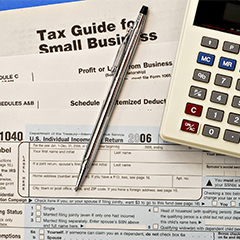Court Decisions Make it Easier to Deduct LLC Losses
November 27, 2017 | Business Plans, Court Rulings, Tax Planning, Tax Preparation
 What happens if you’re the owner of a limited liability company (LLC) that generates tax losses, and you don’t spend a lot of time in the activities of the business? The losses might be classified as passive, and your ability to currently deduct them might be severely restricted by the passive activity loss (PAL) rules.
What happens if you’re the owner of a limited liability company (LLC) that generates tax losses, and you don’t spend a lot of time in the activities of the business? The losses might be classified as passive, and your ability to currently deduct them might be severely restricted by the passive activity loss (PAL) rules.
Thankfully, some court decisions make it much easier for LLC owners to escape the PAL rules and thereby deduct LLC losses from non-rental activities in the year they are incurred. In today’s economy, being able to currently deduct tax-saving losses is a big deal because losses are common and cash may be tight. So these court decisions are good news for LLC owners.
LLC Basics
Using an LLC to own and operate a business shields your personal assets from most business-related liabilities. This liability protection advantage is similar to what you would get with a corporation. However, the tax rules for LLCs are more flexible and often more beneficial than the rules for corporations.
If you have an LLC with several owners, it’s called a multi-member LLC, and will generally be taxed under the partnership rules. If so, your share of the LLC’s income, deductions, and tax credits are reported on a Schedule K-1 delivered to you by the LLC as part of its annual tax filing obligations. The LLC tax items are then reported on your personal tax return.
If you’re the sole owner of an LLC, it’s called a single-member LLC (SMLLC), and its existence is generally ignored for tax purposes. The SMLLC’s tax items are reported on your personal tax return.
Passive Activity Loss (PAL) Basics
The PAL rules state that passive losses from a business activity can generally be used only to offset passive income from other passive activities. Passive losses in excess of your passive income for the year are suspended and carried forward to future years. You can deduct them in future years when and if you have passive income or when and if you sell or otherwise dispose of the activity that generated the suspended losses. The problem is that many taxpayers have little or no passive income for years at a time, so their passive losses can remain suspended for years.
Thankfully, a loss-generating activity is exempt from the PAL rules if you materially participate in it, because meeting the material participation standard makes it non-passive. That means you can deduct losses from the activity in the year they are incurred (assuming no other tax-law provision prevents you from doing so).
The IRS has a series of seven tests to determine if a business owner is materially participating in the loss-generating activity. There have been four recent court cases regarding whether or not a business owner has to pass all seven of them to be exempt from the PAL rules. In effect, all four decisions say LLC owners should be treated the same as general partners when taking the material participation tests. General partners can take all seven of the tests, including the two easiest ones. If any of the tests are passed for the loss-generating activity in question for the year in question, the activity is exempt from the PAL rules for that year, and the losses from the activity can be deducted in that year
The bottom line is that an LLC owner has only to pass one of the tests to meet the material participation standard for an activity and thereby make that activity exempt from the PAL rules. This is great news for owners of LLCs that throw off losses, such as fishing boat charter and air charter operations and start-up businesses. Filler & Associates can help you navigate through this process.
If you have a loss-generating LLC or SMLLC, consult with Filler & Associates to make sure you understand all the other tax loss limitations that can potentially come into play.
